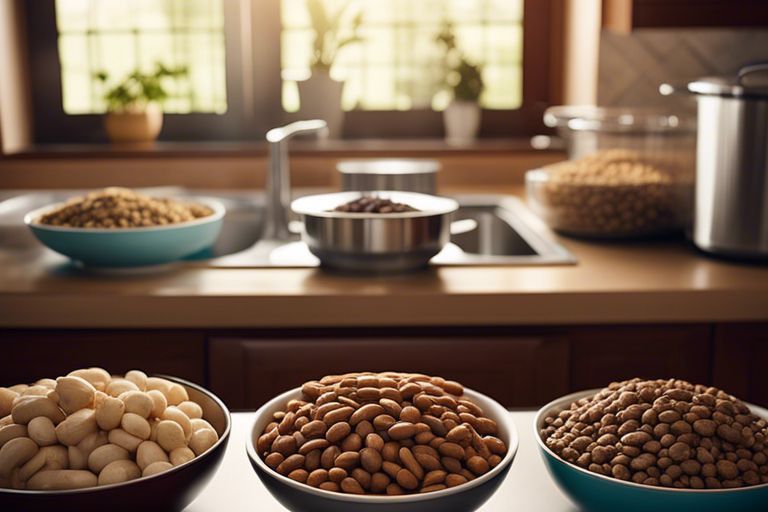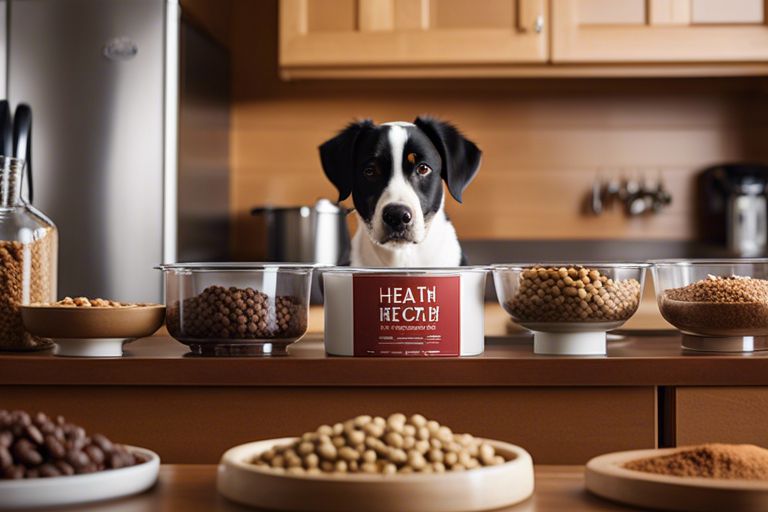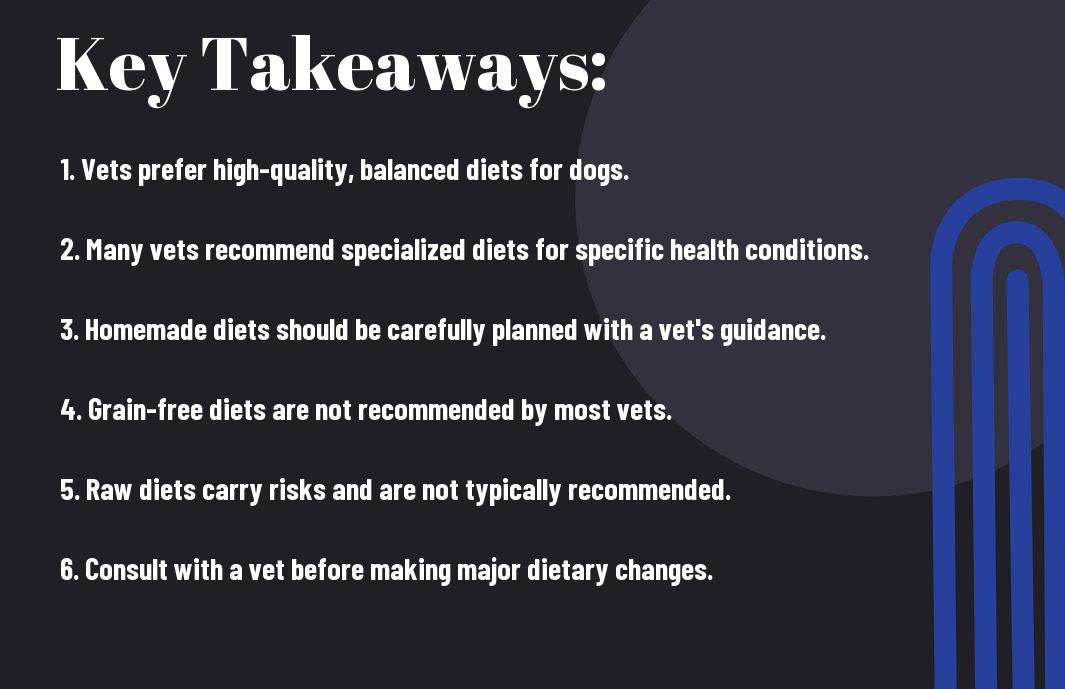It’s a common question among pet owners: what do the experts feed their own furry companions? In this informative exploration, we research into the world of veterinary preferences when it comes to feeding their beloved dogs. Discover the top choices and factors that influence most vets’ decision-making process when it comes to selecting the best nutrition for their canine friends.
Key Takeaways:
- Most vets feed their dogs premium brands: A majority of veterinarians choose to feed their own dogs premium dog food brands.
- Emphasis on quality ingredients: Vets prioritize dog foods with high-quality ingredients, focusing on nutrition and health benefits.
- Consult with your vet for recommendations: It is vital to consult with a vet to determine the best food for your dog’s specific needs and health requirements.
The Importance of Nutrition in Canine Health
The Role of Diet in Preventing Health Issues
Health experts agree that proper nutrition plays a crucial role in maintaining a dog’s overall health and well-being. By providing dogs with a balanced diet that meets their specific nutritional needs, pet owners can help prevent a wide range of health issues, including obesity, diabetes, joint problems, and digestive disorders. Additionally, a healthy diet can strengthen the immune system, improve skin and coat health, and contribute to a longer lifespan for our furry companions.
Why Vets Take Nutrition Seriously
With the rise of pet obesity and related health issues, veterinarians are increasingly emphasizing the importance of nutrition in canine health. Vets understand that many common ailments seen in dogs can be linked back to poor diet choices, leading them to prioritize nutritional counseling as a key aspect of preventive care. By recommending high-quality, balanced diets tailored to each dog’s individual needs, veterinarians can help prevent a myriad of health problems and improve the overall quality of life for their patients.
The significance of nutrition in canine health cannot be overstated, as what dogs eat directly impacts their energy levels, weight management, and disease susceptibility. Vets advocate for proper nutrition not only to address existing health issues but also to proactively safeguard against future ailments, promoting long-term health and vitality for our beloved pets.
Surveying the Experts
Now, to uncover the truth about what food most vets feed their dogs, we turn to a survey conducted by Emancipet. Their insightful findings shed light on this important question. For more information on the best dog food brands, check out What’s the Scoop on the Best Dog Food Brands?
Methodology: How We Gathered Information
With a rigorous approach to data collection, Emancipet surveyed a diverse group of veterinarians to understand their preferences when it comes to feeding their canine companions. By asking specific questions and analyzing the responses, valuable insights were obtained to paint a clear picture of the most popular choices among veterinary professionals.
Demographics: Who Participated in the Survey
Gathered from various regions and practice settings, the participants in the survey consisted of both seasoned veterinarians and those in the early stages of their careers. This diversity ensured a well-rounded perspective on the topic and offered a comprehensive view of the trends in dog food choices among different segments of the veterinary community.
The survey also included a mix of general practitioners and specialists, providing a nuanced understanding of how different veterinary professionals approach the important decision of selecting the best food for their dogs. By encompassing a wide range of demographics, the survey results offer valuable insights that can benefit all dog owners seeking guidance on this matter.
Top Choices Among Vets
Kibble or Canned: What’s the Most Popular?
Most veterinarians recommend feeding dogs a balanced diet that meets their nutritional needs. With respect to choosing between kibble and canned food, the majority of vets lean towards recommending high-quality kibble. Kibble is convenient, cost-effective, and provides a complete and balanced diet for dogs. While some vets may advocate for canned food due to its higher moisture content, the general consensus among vets is that a good quality kibble is the best option for most dogs.
Grain-Free or Not: The Vet Perspective
The debate around grain-free diets for dogs has been ongoing, with various opinions among vets. Some veterinarians support grain-free diets, especially for dogs with specific dietary sensitivities or allergies. However, the majority of vets caution against grain-free diets unless necessary, as they may lack imperative nutrients found in grains that are beneficial for dogs.
It’s imperative to consult with your veterinarian before making any dietary changes for your dog, especially regarding grain-free diets. Vets can provide personalized recommendations based on your dog’s individual needs and health condition.
Novel Protein Sources: Are They a Hit or Miss?
Sources of novel proteins, such as venison, bison, or duck, have gained popularity in dog food formulations. Vets recognize that novel protein sources can be beneficial for dogs with food allergies or sensitivities to common proteins like chicken or beef. However, it’s crucial to introduce novel proteins gradually and under veterinary supervision to monitor for any adverse reactions.
When considering novel protein sources for your dog, seek advice from your veterinarian to ensure a balanced diet that meets all of your dog’s nutritional requirements.
Nutritional Priorities
Once again, when it comes to choosing the right food for your dog, understanding their nutritional priorities is crucial. A well-rounded diet plays a significant role in your pet’s overall health and well-being. Let’s explore the key components that make up a balanced canine diet.
Protein Content: How Much is Enough?
For dogs, protein is a crucial component of their diet as it helps to build and repair tissues, support a healthy immune system, and provide energy. Most veterinarians recommend that dog food should contain at least 18-25% protein, depending on the dog’s age, size, and activity level. It’s imperative to ensure that the protein source is of high quality and easily digestible.
Fat and Carbohydrates: The Ideal Balance
Balance is key when it comes to the fat and carbohydrate content in your dog’s food. Fat is a concentrated source of energy and also aids in the absorption of fat-soluble vitamins. On the other hand, carbohydrates provide a readily available energy source. The ideal balance of fat and carbohydrates in your dog’s diet will depend on factors such as their breed, age, and activity level.
Ideal fat content for most dogs falls between 10-15% in their diet, while carbohydrates can range from 30-70%. It’s imperative to monitor your dog’s weight and adjust their food intake accordingly to maintain a healthy balance.
Vitamins and Minerals: Essential Additives
Vitamins and minerals are imperative additives in a dog’s diet to support various bodily functions, including bone health, metabolism, and immune system function. A well-balanced dog food should contain adequate levels of vitamins such as A, D, E, and minerals like calcium, phosphorus, and potassium.
Carbohydrates also play a role in providing fiber, which aids in digestion and helps maintain a healthy weight for your dog. Whole grains and vegetables are good sources of carbohydrates that can be included in your dog’s diet.
Dietary Restrictions and Considerations
Food Allergies and Sensitivities: Common Issues
The dietary needs of dogs can vary greatly, and some may have food allergies or sensitivities that require special consideration. The prevalence of food allergies in dogs is on the rise, with common symptoms including skin rashes, itching, digestive issues, and ear infections. Identifying and eliminating the allergen from the dog’s diet is crucial for their health and wellbeing.
Age and Life Stage: Tailoring Nutrition to Need
Tailoring a dog’s diet to their specific age and life stage is imperative for their overall health and longevity. Puppies, adult dogs, and senior dogs have different nutritional requirements, with puppies needing more calories and nutrients for growth and development, adult dogs requiring a balanced diet for maintenance, and senior dogs benefiting from diets focused on joint health and weight management.
Stage-specific diets can help address the unique needs of dogs at different life stages, promoting optimal health and preventing potential issues associated with inadequate nutrition.
Breed-Specific Diets: Do They Make a Difference?
Food tailored to specific breeds is a topic of much debate among veterinarians and pet owners. While some argue that breed-specific diets address the unique genetic and nutritional needs of certain breeds, others believe that a well-balanced diet can meet the needs of all dogs regardless of their breed.
Considerations such as a dog’s size, activity level, and any underlying health conditions may be more important factors to consider when choosing their diet, rather than focusing solely on their breed.
Commercial Brands vs. Homemade Diets
The Pros and Cons of Commercial Dog Food
For a long time, commercial dog food has been the go-to option for pet owners looking for convenient and nutritionally balanced meals for their furry companions. However, there are some drawbacks to consider when it comes to feeding your dog commercial pet food.
| Cons | Pros |
| May contain fillers and additives | Convenient and easy to store |
| Potential for recalls and quality control issues | Formulated to meet AAFCO standards |
| Uniformity in nutrients can be questionable | Widely available in stores and online |
| Can be expensive in the long run | Offers a variety of flavors and formulations |
The Rise of Homemade Diets: Is it a Fad or Here to Stay?
To meet the growing demand for more natural and personalized diets for pets, homemade diets have become increasingly popular among pet owners. While some may view this trend as a passing fad, many experts believe that homemade diets are here to stay.
It is vital to note that switching to a homemade diet requires careful planning to ensure that your dog receives all the necessary nutrients for their health and well-being. Consulting with a veterinarian or a pet nutritionist can help create a balanced homemade diet that meets your dog’s specific needs.
Balancing Convenience and Nutrition
With the increasing availability of high-quality commercial pet foods and the rise of homemade diets, pet owners are faced with the challenge of balancing convenience and nutrition when choosing what to feed their dogs. Convenience often wins out for busy pet owners, but nutrition should always be a top priority when it comes to your furry friend’s diet.
Another important consideration is that some dogs may have specific dietary requirements or health issues that can be better managed with a homemade diet tailored to their needs. It is vital to weigh the pros and cons of both commercial and homemade diets to make an informed decision that best suits your dog’s individual needs.
Conclusion
Upon reflecting on the topic of “What food do most vets feed their dogs,” it is evident that the majority of veterinarians prioritize high-quality, nutritious food for their canine companions. Their expertise in animal nutrition and health guides their choices, ensuring that their dogs receive the best care possible. With a focus on balanced diets and specific dietary needs, vets understand the importance of good nutrition in maintaining a pet’s overall well-being.
In closing, the food choices made by most vets for their dogs underscore the significance of proper nutrition in a pet’s life. By selecting reputable brands and products that meet their furry friends’ dietary requirements, veterinarians set an example for all pet owners to prioritize their pets’ health and happiness through mindful food choices.
FAQ
Q: What food do most vets feed their dogs?
A: Most vets feed their dogs high-quality commercial dog food that meets AAFCO (Association of American Feed Control Officials) standards.
Q: Are there specific brands of dog food recommended by vets?
A: While specific recommendations may vary, some vets recommend brands like Hill’s Science Diet, Royal Canin, Purina Pro Plan, and Eukanuba due to their focus on research and quality ingredients.
Q: Do vets ever recommend homemade or raw diets for dogs?
A: Some vets may recommend homemade or raw diets for dogs but caution that these diets can be challenging to balance and may not provide all the necessary nutrients. It’s important to consult with a vet or veterinary nutritionist before switching to homemade or raw diets.
Q: How important is diet in a dog’s overall health according to vets?
A: Vets emphasize that a balanced and nutritious diet is crucial for a dog’s overall health and well-being. Proper nutrition can help prevent diseases, maintain a healthy weight, and support a dog’s immune system.
Q: What should dog owners consider when choosing food for their pets?
A: Dog owners should consider factors such as their dog’s age, breed, size, activity level, and any specific health conditions when choosing food. Consulting with a vet can help determine the best diet for an individual dog.
Are strawberries toxic for dogs
Demystifying Anal Gland Issues in Dogs: Your Comprehensive Guide from the American Kennel Club




